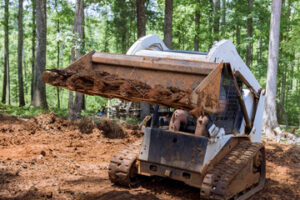Tree Cutting Irvine involves trimming and pruning to promote tree health, longevity, and aesthetic appeal. However, cutting trees improperly can cause structural weaknesses and introduce entry points for diseases and pests.

For example, cutting a live tree at the wrong time of year can stress the plant and divert resources from growth to heal the wound. The best cuts also create a natural compartmentalization process, which helps prevent disease and decay.
For many homeowners, tree cutting is a necessary step to keep the landscape healthy and beautiful. Whether a tree is suffering from disease or it has outgrown the surrounding property, there are many reasons that it may need to be cut down. It’s important to have a certified arborist on hand to make sure the trees are being treated and maintained correctly, but sometimes a removal is the best choice for both safety and aesthetics.
When to start tree cutting can be a complicated decision and depends on a variety of factors, but the dormant season is usually the most ideal time for pruning and removals. In general, this is during the late fall and early spring when the tree is not growing and will be less susceptible to stress and disease. Additionally, when a tree is dormant, it’s much easier for a certified arborist to inspect the health of the plant and to cut precisely where needed.
As far as the tools go, a good pair of steel-toe boots is essential. Accidents can occur at any time, and a sturdy pair of boots will protect your feet from sharp gear and falling debris. You’ll also want to use a strong ladder and wear a hard hat as well.
Aside from ensuring that you have the right equipment, it’s essential to take special care of your hands when performing tree cutting and trimming. Using a hard, sharp blade is a dangerous activity and can cause serious injury to your hands if not handled properly. Always be mindful of your hands and work slowly to avoid injury.
In addition to the safety precautions above, it’s a good idea to leave an offering for the tree at the base after it has been cut down. Leaving something like flowers or wood can be a way to show your appreciation and respect for the tree. Alternatively, you can pour water over the base of the plant to give it life again or spray a water mist with essential oils, Rescue Remedy, or another natural healing plant essence.
The Tools
Having the proper equipment is essential for tree cutting. Using quality tools not only makes the job easier and faster but also helps promote tree growth by making clean cuts that protect a tree’s health.
For small jobs, the best tool for trimming trees is a pair of hand pruners or lopping shears. These tools are designed to cut smaller branches up to two inches in diameter. Opt for a pair that has interchangeable cutting tools like a bypass or anvil to help you trim more efficiently. For larger projects, look for a pole pruner with a variety of reach extenders to allow you to trim branches above your head.
Professional arborists use a variety of other tree-cutting tools, including saws and power chippers for more involved projects. Keeping all your pruning tools sharp will provide cleaner cuts, reduce cutting fatigue and extend tool life. Depending on the size of your project, you may also need to use a wood chipper to grind up the leftover debris for easy disposal.
The Safety Precautions
As with any work involving power tools, safety is a major concern. The best way to prevent any accident is to be aware of the hazards involved and take steps to avoid them. It is also important to make sure that the equipment used for cutting down trees is in good working condition before using it. Lastly, it is crucial to have an observer or helper to keep an eye out for any potential problems.
Professionals who are experienced in tree felling have a procedure that they follow to ensure that the tree falls correctly and minimize risks. First, they check the surroundings and estimate where the tree will fall. This is especially important on sloping or hilly terrain. Then, they will cut a notch into the tree on the desired falling side. This is to help the tree fall correctly as it may be compressed in the middle from the weight of the log section or firewood piece that will eventually be rolled up beneath it.
The next step is to remove the branches and leaves that are close to the area of the tree where it will be dropped. This is to prevent any limbs from hitting people or other objects when it falls. This is usually done by hand, although larger limbs can be removed with the use of a crane.
Another vital safety precaution is to make sure that the work area is free of obstacles such as power lines, fences and building units. This will ensure that no one is in danger of getting hurt or damaging property when the tree is cut down. The team will also try to avoid causing any damage to prized ornamental shrubs and other landscaping features near the site of the fallen tree.
If the work site is close to overhead power lines, the professionals will carefully examine the surrounding area for any potential dangers and warn anyone in the vicinity of their presence. If there are any lines near the area where the tree is being removed, it will be necessary to contact the utility company and ask them to turn off the lines before beginning work. In addition, the workers will wear protective equipment including hard hats, goggles, hearing protection and fluorescent vests.
The Final Cut
For a wide range of reasons, some trees need to be cut down. This could be due to a disease in the tree, the tree being in a poor location where it may cause damage, or the tree simply needs to be removed because it’s too old and overgrown. Whatever the reason, cutting a tree properly is vital to its health and longevity. If it’s done incorrectly, a tree can experience structural weaknesses or even die.
The first cut when chopping down a tree is known as the face cut and it’s made on the side toward which the tree will fall. It should be about 20 to 30 percent of the way up from the stump.
Next comes the notch cut, which is a wedge shaped cut that will control how the tree falls. The notch cut should be about 25% of the diameter of the tree. Once the notch cut is made, a back cut is then made on the opposite side of the notch. This will disconnect almost all of the remaining trunk from the stump, leaving a hinge that can help control how the tree will fall.
Another important cut to make is the undercut. This is a cut that extends two inches out from the base of the notch. This allows the limb to break away from the tree as it falls, reducing damage and potential hazards. A big no-no is making a flush cut or stub cut, which removes the branch collar and leaves a wound that will open up to bugs and diseases. If a tree is trimmed correctly, it will compartmentalize the wound and seal it over time.
Performing this type of work requires a lot of skill, and it’s best left to the professionals. They can use a crane or bucket truck to reach the high areas of a tree and then perform limbing, which is the process of cutting branches or removing large sections of a tree while it’s still standing. They can also cut up a fallen tree to make it easier to transport and dispose of.
